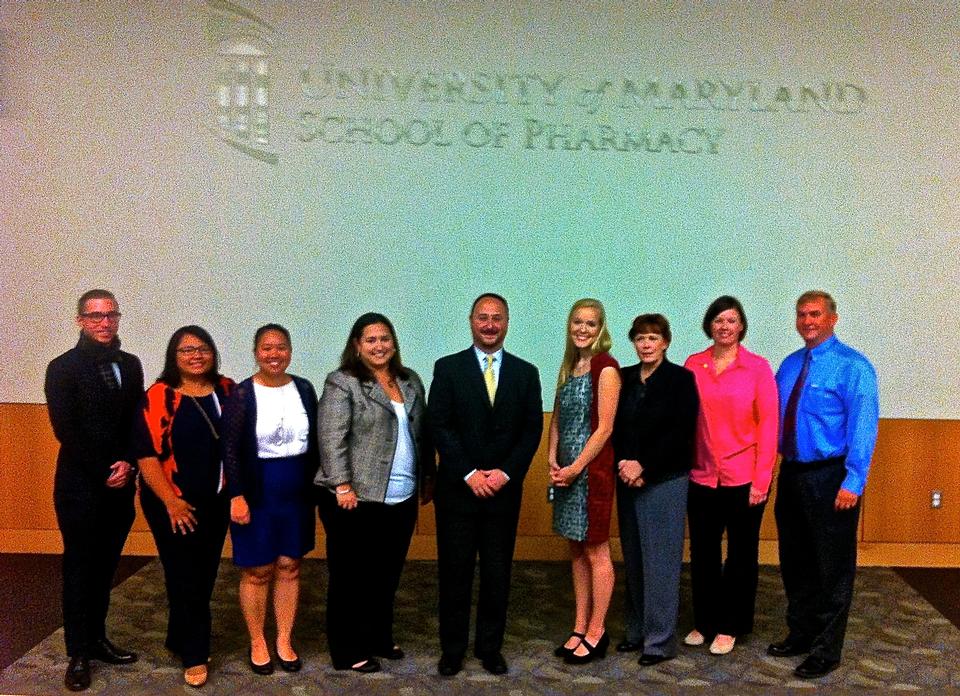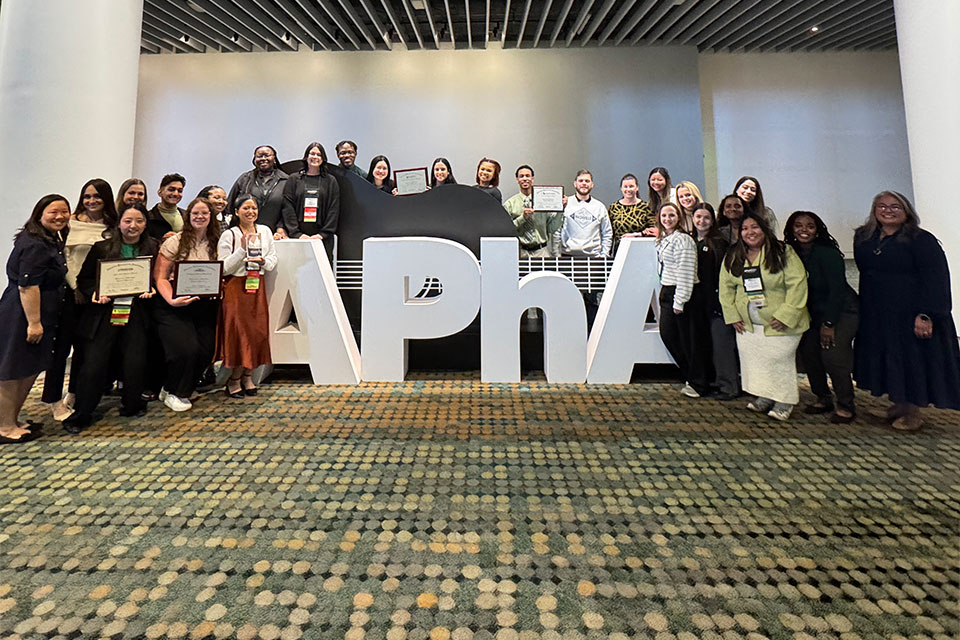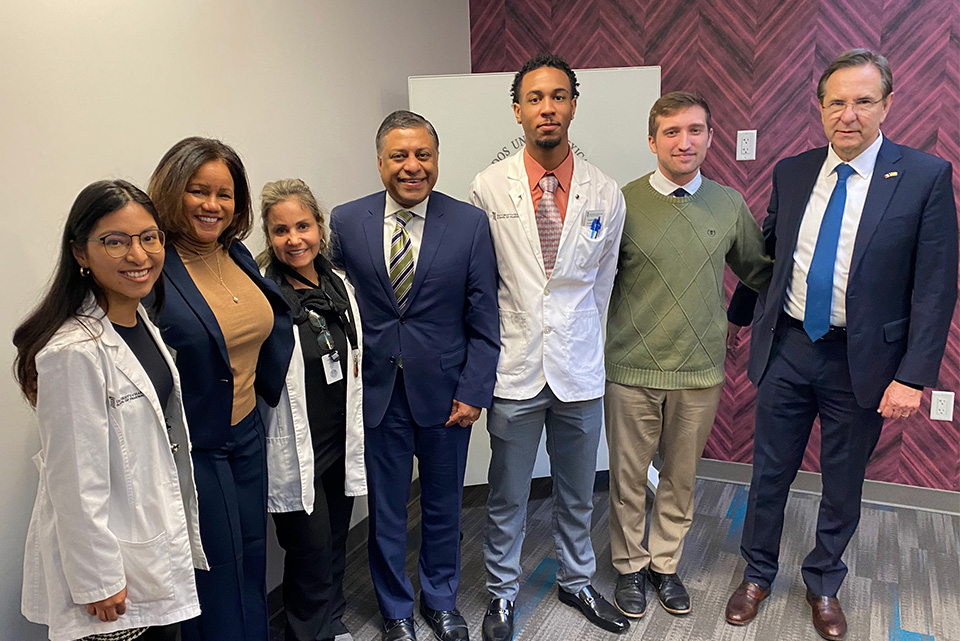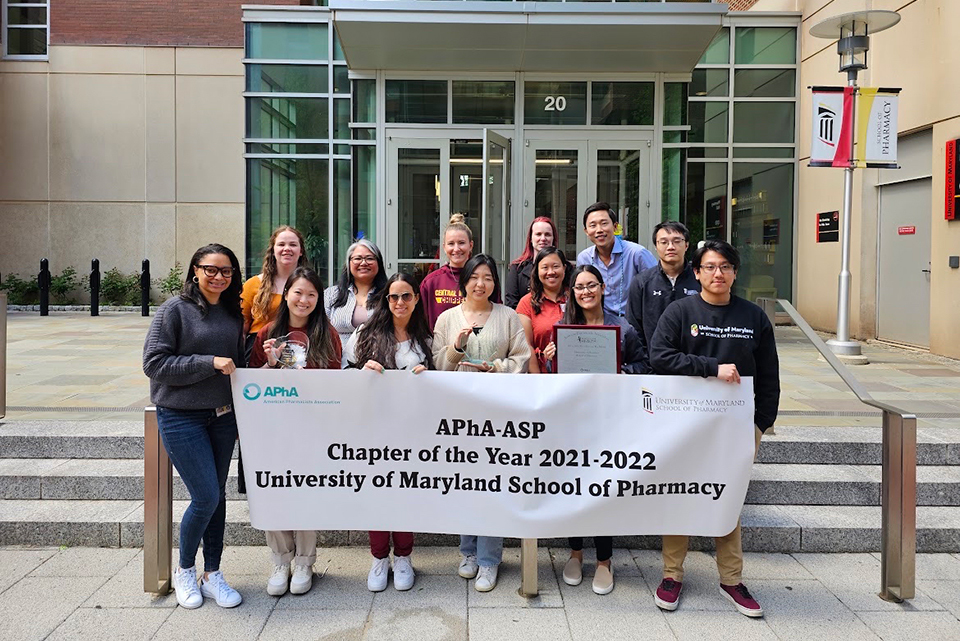APhA-ASP Hosts Seminar to Educate School Community About Provider Status
Policy experts join student-led panel discussion to emphasize the importance of advocating for the pharmacy profession and the need for provider status.

By Multiple Authors*
November 17, 2014
The American Pharmacists Association — Academy of Student Pharmacists (APhA-ASP) at the University of Maryland School of Pharmacy hosted a panel discussion on Nov. 3 that brought health care policy experts to the School to help educate audience members about the importance of advocating for the pharmacy profession, particularly as it relates to gaining provider status for pharmacists across the state of Maryland.
“Provider status is one of the biggest issues that affects pharmacy practice today and an issue for which pharmacists and student pharmacists alike must continue to advocate,” says Cherokee Layson-Wolf, PharmD, CGP, BCACP, FAPhA, associate dean for student affairs and one of APhA-ASP’s faculty advisors. “Beginning in their first semester, our students are instilled with a sense of responsibility to help advocate for and advance the profession. This seminar was an excellent example of how our students take seriously this responsibility and work to ensure that others understand the vital role that pharmacists can play as members of the health care team.”
Four speakers with experience advocating for a wide range of health care-related causes were invited to share their expertise and insight with students: Michael Spira, MA, senior lobbyist for APhA; Deborah DeWitt, JD, assistant dean for policy and planning at the School of Pharmacy; Rachel Tabakman, MA, government affairs specialist at the University of Maryland, Baltimore (UMB); and Wayne VanWie, BSP ’88, owner of Professional Pharmacy in Rosedale and a trustee of the Maryland Pharmacist Association (MPhA). Each panelist highlighted current legislative activities within the pharmacy profession, including the effort to encourage Congress to pass HR 4190.
Introduced by Congressman Brett Guthrie from Kentucky, HR 4190 is a crucial piece of legislation that, if passed, would enable Medicare beneficiaries to access pharmacist-provided ambulatory-based patient care services as well as recognize pharmacists working in medically underserved areas as health care providers, which would allow them to be reimbursed for their services under Medicare Part B.
Spira began the discussion by educating the audience about the importance of advocacy, and how student involvement is critical to the future of pharmacy practice. He spoke about the ever-increasing issue of patients’ non-adherence to their medications and explained how pharmacists are poised to play a pivotal role in improving patient outcomes in health care.
“Having pharmacists recognized as health care providers under Medicare Part B will allow for greater intervention in care and improved patient outcomes when managing complex prescription regimens,” he said.
DeWitt and Tabakman explained that, as the legislation gains momentum, more health care organizations are joining the push for pharmacists to gain provider status.
“By starting a dialogue to inform lawmakers and the general public about the many interventions that pharmacists are capable of providing, we are beginning to see a shift in the future of pharmacy,” said DeWitt. “Pharmacy is already considered to be one of the most trusted professions. Our goal is to now shed light on the benefits of integrating pharmacists into team-based approaches for patient treatment.”
To conclude the discussion, Van Wie emphasized that students need to get involved in the profession and stay involved even after graduation. “The road to provider status is one that requires vigilance and a constant presence in the lobbying process,” he said.
APhA-ASP also believes that student pharmacists are a critical voice in the call for provider status. Here are some of the ways that you can get involved to help maintain the momentum of HR 4190:
- Participate in the School’s Annual Legislative Day: APhA-ASP will collaborate with the Student Government Association in February 2015 to provide a series of advocacy training sessions for student pharmacists. These training sessions will inform students about current pharmacy-related legislation and offer tips about discussing this legislation with state legislators and legislative staff during the School’s annual Legislative Day at the Maryland General Assembly in Annapolis.
- “Thank You” Card Thanksgiving Campaign: APhA-ASP will be sending “thank you” cards to all HR 4190 co-sponsors nationwide. The goal of these cards is to thank co-sponsors for their support and ask for their continued involvement in the next congressional session. APhA-ASP is seeking students from states with co-sponsors for HR 4190 to sign these pre-printed cards. Members of APhA-ASP’s Policy and Advocacy Team will also be reaching out to collaborate with other pharmacy schools nationwide. Those interested in participating in this activity should contact Amy Howard at akhoward@umaryland.edu.
- Statewide Petition to Support Provider Status: To help encourage Maryland’s federal lawmakers to consider co-sponsoring this important piece of legislation, APhA-ASP will collaborate with pharmacy schools across the state of Maryland to ensure the maximum number of faculty and students sign the petition, which will be hand-delivered to Congressional members on Capitol Hill in early February. Students can also add their voice to the movement by signing the petition to request provider status at www.pharmacistsprovidecare.com.
- Contact Your Lawmakers: APhA-ASP encourages all students to call, write, or visit their local representatives to educate them about issues that are important to the pharmacy profession. Visit www.pharmacist.com/advocate for tips on how to become an advocate for the profession.
*This story was co-written by APhA-ASP members Jane Ching, Farrah Tavakoli, and Ryan Button.



